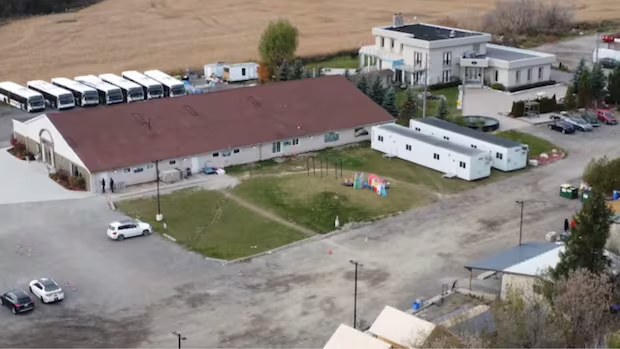The Government of Canada has announced it will end federal funding for hotel accommodations for asylum seekers by September 30, 2025.
Immigration, Refugees and Citizenship Canada (IRCC) confirmed that this transitional housing support originally introduced to respond to spikes in migration, was never intended to be a permanent solution.
With nearly $1.1 billion spent since 2020 on temporary hotel housing, the program’s closure raises serious questions about shelter capacity, housing access, and the treatment of vulnerable asylum claimants across Canada.
Why the Government Funded Hotel Housing for Asylum Seekers
Since at least 2018, the federal government has provided hotel rooms as emergency shelter for asylum seekers. These rooms helped cities absorb high volumes of refugee claimants, especially during periods of irregular border crossings and global crises like COVID-19.
As of July 2025, IRCC was housing 485 asylum seekers i five hotels across Ontario and Quebec. According to IRCC, the initiative was a temporary emergency response—not a permanent housing program.
“This measure was never meant to be permanent,” IRCC stated. “Hotel operations are funded only until September 30, 2025.”
— IRCC spokesperson
IRCC’s Position: Focus Shifts to Housing Transition Support
Despite the phaseout, IRCC has pledged to support the remaining 485 asylum seekers in hotels as they transition into independent housing. The department emphasized ongoing collaboration with municipalities and provinces to build long-term solutions.
Specifically, IRCC said it will:
-
Offer on-site support during the transition
-
Help claimants find long-term housing
-
Continue funding provincial and local housing strategy development
New Challenges for Asylum Seekers After Hotel Support Ends
While the number of new asylum seekers has dropped by nearly 40% compared to 2024, housing shortages remain critical. With municipal shelters already at or near capacity, many fear the upcoming deadline will overwhelm local support systems.
Adaoma Patterson, Director of Community Investments at United Way Greater Toronto, highlighted the risks:
“Shelters take a long time to build. They can’t appear overnight. Many asylum seekers may end up in overcrowded or unsafe conditions if this transition isn’t managed carefully.”
Even in regions like Peel, where a dedicated shelter for asylum seekers exists, capacity is strained. Affordable housing remains scarce, and many landlords are reluctant to rent to newcomers without job history or credit records.
Potential Risks: Homelessness, Health Issues, and Public Burden
Housing instability for asylum seekers can lead to:
-
Overcrowding in shelters or shared homes
-
Increased homelessness, especially in urban centers
-
Compromised health, due to poor living conditions
-
Pressure on emergency services, local charities, and city budgets
In extreme cases, inadequate housing could lead to medical emergencies or death, as Patterson warned.
Policy Setbacks: Asylum Reform Plan Canceled
The federal government has also canceled a $68 million project meant to modernize the asylum system. This included digitizing processing workflows and improving refugee intake systems.
The rollback is especially concerning given that the government is also pushing for tighter border enforcement through sweeping new powers outlined in a proposed border security bill.
These changes signal a shift from humanitarian protection toward stricter immigration control despite Canada’s obligations under international refugee law and domestic legal protections outlined in the Immigration and Refugee Protection Act (IRPA).
The Bigger Picture: Are We Setting Asylum Seekers Up to Fail?
Over 15,000 asylum seekers have already moved out of hotel accommodations since 2020, according to IRCC. But success depends on stable housing, legal aid, and access to services like healthcare and mental health support.
In July, the government announced a new facility in Toronto with integrated mental health services for asylum seekers.
However, critics argue that this initiative, while positive, doesn’t go far enough to replace the scale of support hotels provided nationwide.
Municipalities Demand Fair Share from Ottawa
Cities like Windsor and Toronto are urging Ottawa not to offload housing responsibilities without additional funding.
Windsor’s mayor has accused the federal government of “downloading costs” related to hosting asylum seekers onto local governments, who are ill-equipped to absorb them without federal support.
Unless IRCC ensures a smooth exit strategy from the hotel program, asylum seekers risk falling through the cracks and municipalities may bear the financial and social consequences.
What Should Asylum Seekers Expect?
If you are currently in Canada as an asylum seeker staying in a federally funded hotel, you must prepare for the upcoming policy shift. The government will end hotel funding by September 30, 2025, and your relocation must happen before that date. Delaying action could leave you without safe shelter.
Here are four urgent steps to take:
-
Contact IRCC or your caseworker to confirm your hotel departure timeline and next steps.
-
Reach out to local settlement agencies such as COSTI, YMCA, or United Way for temporary housing support and referrals.
-
Secure legal representation to protect your rights, avoid delays, and receive guidance on your claim process.
-
Explore municipal or provincial emergency housing programs, especially if you have dependents or health concerns.
The Legal Viewpoint: Humanitarian Protection Must Stay Intact
Canada’s obligation to protect asylum seekers stems not only from its own legal framework but also from global commitments such as the 1951 Refugee Convention and the UN Convention Against Torture.
While funding changes and operational shifts are part of managing migration, these must never compromise the safety or dignity of asylum claimants.
The cancellation of the asylum system overhaul and the ramp-up in border restrictions should be closely scrutinized for potential Charter violations or failures in procedural fairness.
Conclusion: Urgency, Rights, and Responsibility
Canada stands at a critical crossroads in how it treats the most vulnerable people seeking safety within its borders.
Ending federal hotel funding for asylum seekers may reduce short-term costs, but without a solid housing transition strategy, the long-term consequences could be severe for individuals, municipalities, and the country’s global reputation.
Asylum seekers are not just numbers in a system. They are human beings escaping persecution, war, and systemic violence. They deserve dignity, stability, and a fair chance to rebuild their lives. Stripping away emergency housing without scalable alternatives risks pushing people into homelessness, poor health, or even deportation due to administrative failure—not legal merit.
If you or someone you know is affected, now is the time to act. At Maple Crest Immigration Immigration Law Firm, we are committed to protecting your rights, guiding your claim, and helping you transition safely. Contact us today




